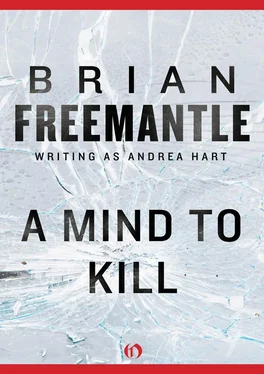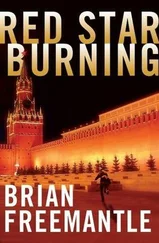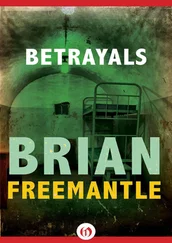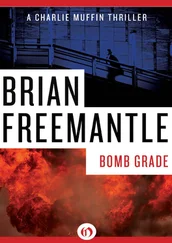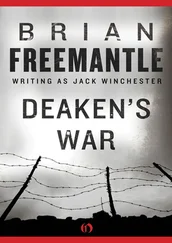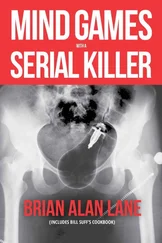Brian Freemantle - A Mind to Kill
Здесь есть возможность читать онлайн «Brian Freemantle - A Mind to Kill» весь текст электронной книги совершенно бесплатно (целиком полную версию без сокращений). В некоторых случаях можно слушать аудио, скачать через торрент в формате fb2 и присутствует краткое содержание. Жанр: Триллер, на английском языке. Описание произведения, (предисловие) а так же отзывы посетителей доступны на портале библиотеки ЛибКат.
- Название:A Mind to Kill
- Автор:
- Жанр:
- Год:неизвестен
- ISBN:нет данных
- Рейтинг книги:3 / 5. Голосов: 1
-
Избранное:Добавить в избранное
- Отзывы:
-
Ваша оценка:
- 60
- 1
- 2
- 3
- 4
- 5
A Mind to Kill: краткое содержание, описание и аннотация
Предлагаем к чтению аннотацию, описание, краткое содержание или предисловие (зависит от того, что написал сам автор книги «A Mind to Kill»). Если вы не нашли необходимую информацию о книге — напишите в комментариях, мы постараемся отыскать её.
A Mind to Kill — читать онлайн бесплатно полную книгу (весь текст) целиком
Ниже представлен текст книги, разбитый по страницам. Система сохранения места последней прочитанной страницы, позволяет с удобством читать онлайн бесплатно книгу «A Mind to Kill», без необходимости каждый раз заново искать на чём Вы остановились. Поставьте закладку, и сможете в любой момент перейти на страницу, на которой закончили чтение.
Интервал:
Закладка:
‘Mr Hall?’ invited the judge, with the briefest grimaced smile.
There was no swagger this time when Superintendent Bentley approached the witness-box. The suit, blue, was as immaculate as before but there was no buttonhole carnation.
‘You headed the investigation into the murder of Gerald Lomax?’
‘Yes, sir.’
‘Sir’, noted Hall. ‘There are certain standard procedures in such investigations, are there not?’
‘Yes, sir.’
‘Is one of those standard procedures taking fingerprints from an accused, once that accused has been charged?’
‘Yes, sir.’ Bentley wasn’t addressing the assembled journalists, nor smiling in their direction.
‘Did you or one of your junior officers do that, in this case?’
‘No, sir.’
‘Why not?’
‘Mrs Lomax declined to make a statement after I charged her,’ tried the detective. ‘That refusal was confirmed by her solicitor and by you.’
Hall stretched the pause as long as he felt able. Then, ‘Superintendent, we are not discussing statements here, are we? We are talking of standard, operating procedures in murder investigations.’
‘Yes, sir.’
‘You ignored the standard, operating procedures you should have followed in the case of Mrs Lomax, didn’t you?’
‘She was too ill to be fingerprinted on the day of the murder,’ Bentley fought, desperately. ‘After that our enquiries were obstructed.’
‘Obstructed?’ seized Hall. ‘Obstructed by whom?’
‘My officers and I were denied the opportunity of interviewing or taking a statement from Mrs Lomax by yourself and by her solicitor.’
Hall wasn’t perturbed the cross-examination was temporarily going sideways: the detective was damning himself with virtually every answer. ‘Did you. at any time, approach myself or Mr Perry, my instructing solicitor, with a request to fingerprint Mrs Lomax?’
‘No, sir,’ admitted Hall, miserably, all the bombast gone.
‘ Perry Mason shit. Who’s impressed? ’
‘I am: you should be, thought Jennifer.
‘ Guy’s an amateur. Dumped on you.’
‘Did you instruct any of your junior officers to make such a request?’
‘No, sir.’
‘So no official police fingerprints were obtained of a person whom you had charged with murder?’
‘No, sir.’
‘That was a grave mistake, wasn’t it, Superintendent? A clear failure to follow standard operating procedures?’
‘Yes, sir,’ conceded Bentley. His face was blazing.
‘I didn’t hear that,’ protested Jarvis, glaring down.
‘Yes, sir,’ repeated Bentley.
‘Yes, sir, to what?’
‘It was a grave mistake for us not to have taken fingerprints.’ Bentley practically choked on the words.
‘In your evidence-in-chief you were obviously proud of your conviction record. Twelve, was it not?’
‘Yes, sir.’
‘Do you consider yourself an expert in murder investigations, Superintendent?’
Bentley did not immediately reply, fervently seeking an answer that couldn’t be turned against him. In the end, hoping formality would save him, he said, ‘I have brought to a successful conclusion twelve murder investigations.’
‘An enviable record,’ agreed Hall. ‘So murders are a crime you have wide and long experience of investigating?’
‘Yes, sir.’
‘After the conclusion of yesterday’s hearing, you were present with myself and others when the fingerprints of the accused – fingerprints you had failed to obtain – were finally taken?’
Bentley squirmed. ‘Yes.’
He could be forgiven for finally omitting the ‘sir’ but for nothing else, Hall decided. ‘Were you given the opportunity last night to compare Mrs Lomax’s fingerprints with those lifted from the glass wall of Gerald Lomax’s office?’
‘I was.’
‘And were you in court this morning to hear the evidence of the prosecution’s forensic scientist, Doctor Billington?’
‘I was.’
‘They don’t match, do they?’
‘No.’
‘You also heard Doctor Billington’s evidence about blood type and grouping?’
‘Yes.’
‘Mrs Lomax’s blood does not match any of that found in Gerald Lomax’s office, does it?’
‘No, sir.’
‘Superintendent,’ said Hall, allowing the patronizing tone. ‘As an expert in murder investigations – a man who has successfully brought twelve murderers to rightful justice – would you have charged Mrs Lomax with murder if you’d properly carried out the investigation you should have done, from which you would have realized the fingerprints upon the bloodstained murder weapon were not those of Mrs Lomax?’
‘Sixteen people witnessed her do it!’ protested Bentley, writhing.
‘Her fingerprints are not on the knife, are they?’ persisted Hall.
‘No.’
‘Her blood isn’t at the scene, is it?’
‘No.’
‘So answer my question. Would you have charged her with murder?’
‘I would have referred it to higher authority,’ said the detective.
‘Superintendent, who, in your expert opinion and now with the benefit of the forensic evidence you did not earlier have, do you believe murdered Gerald Lomax?’
Bentley looked desperately around the court, as if seeking inspiration. As with Billington, earlier, Keflin-Brown steadfastly refused any rescue because no rescue was possible.
‘Answer the question, Superintendent!’ demanded Jarvis, a bully with a new target.
‘I don’t know, sir,’ Bentley finally capitulated.
‘You do not know who killed Gerald Lomax?’ echoed Hall, triumphantly.
‘No.’
‘I am grateful, finally, for your honesty,’ said Hall to Keflin-Brown’s headshake against the offer to re-examine. As Malcolm Rodgers was summoned, the older barrister leaned sideways and said quietly, ‘You’re not taking prisoners, are you?’
‘Not as readily as everyone else was prepared to do,’ said Hall. He’d made his decision upon that morning’s idea. Perry would probably argue against it. So, most definitely, would the heavy breathing, unctuous Feltham along with Sir Richard Proudfoot. So they wouldn’t get the opportunity: they’d be presented with a fait accompli.
Inspector Malcolm Rodgers was an ambitious career policeman who’d hitched his wagon to Superintendent Bentley’s unstoppable express but who now detected the vibrations of an impending fatal crash. And who had decided, the previous night and then again listening in court so far that day, that it was time to disconnect the coupling. He studiously avoided the staccato and truculent answers that Bentley had given, repeating again and again that he’d gone through every stage of the investigation under the command of a superior officer. He regretted that superior officer had not insisted upon Mrs Lomax’s fingerprints being taken. And would obviously have himself ordered it done by a junior officer – or done it himself – had he not automatically assumed the order for such basic routine had been given while he was otherwise engaged. He could offer no explanation or suggestion for the disparity between the fingerprints and the blood. Certainly, from none of the sixteen eyewitnesses was there evidence of anyone other than Gerald and Jennifer Lomax being in the totally visible room at the time of Gerald Lomax’s death.
‘Who then, in your opinion, killed the man?’ demanded Hall.
‘I do not know, sir,’ dutifully replied the responsibility-avoiding detective.
Which brought Jeremy Hall to Ross Hamilton Forest II, senior partner in the Washington DC law firm of Forest, Pilton and Camperstone, a white-haired, cultivated man with practised, courtly manners and a clipped, New England accent. Forest had reached the court fifteen minutes before the afternoon resumption, giving Hall ample time to read and discuss the documentation the man carried. It was, in fact, that documentation that finally decided Hall upon the application he intended making. But which now – while Forest was being formally sworn and thanked by Sir Ivan Jarvis for his Atlantic dash (‘an act of unprecedented legal cooperation between our two countries and our two legal systems,’) to Forest’s repeated assurance that it was nothing, nothing at all, sir – Jeremy Hall had stomach-hollowing second thoughts.
Читать дальшеИнтервал:
Закладка:
Похожие книги на «A Mind to Kill»
Представляем Вашему вниманию похожие книги на «A Mind to Kill» списком для выбора. Мы отобрали схожую по названию и смыслу литературу в надежде предоставить читателям больше вариантов отыскать новые, интересные, ещё непрочитанные произведения.
Обсуждение, отзывы о книге «A Mind to Kill» и просто собственные мнения читателей. Оставьте ваши комментарии, напишите, что Вы думаете о произведении, его смысле или главных героях. Укажите что конкретно понравилось, а что нет, и почему Вы так считаете.
